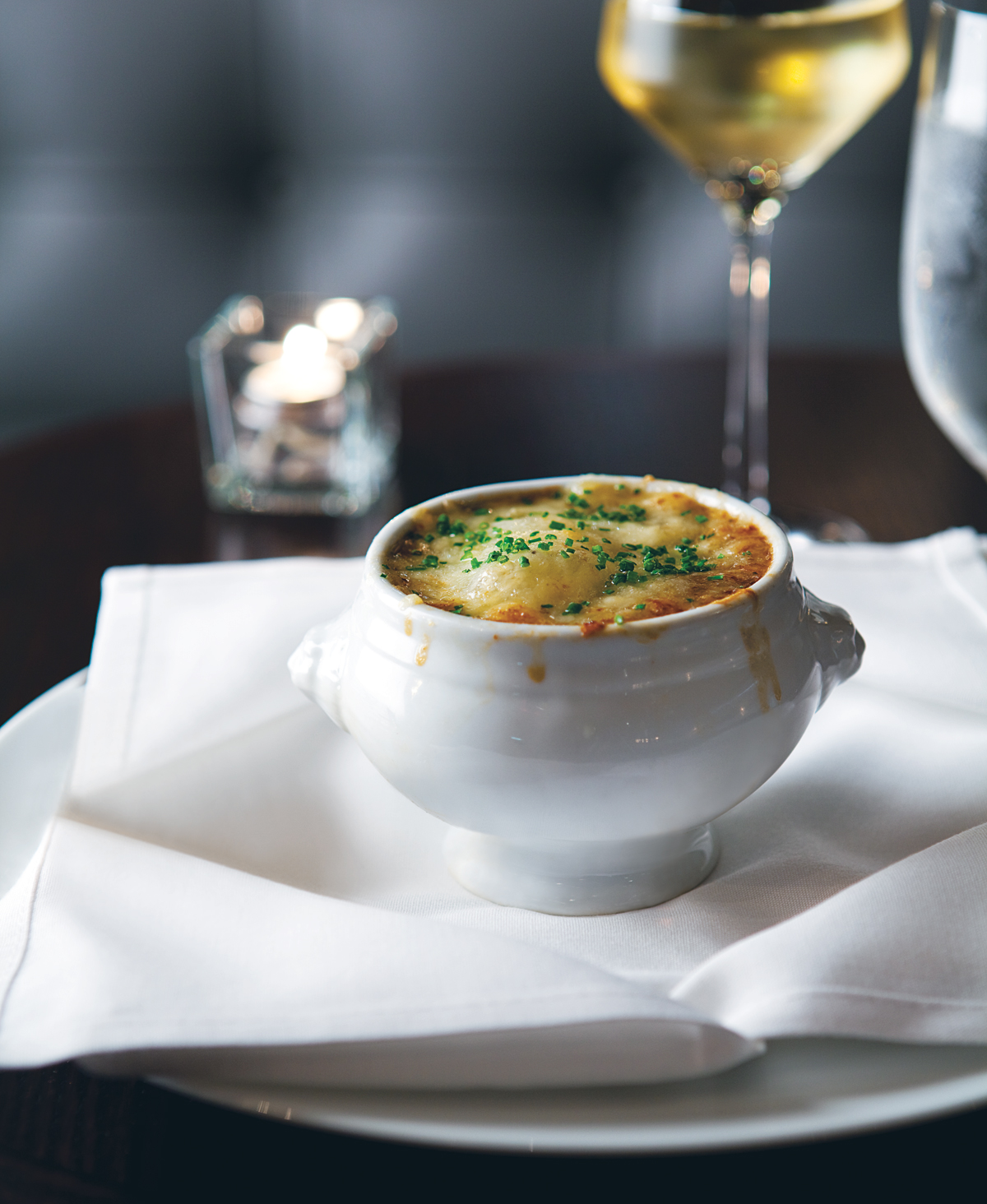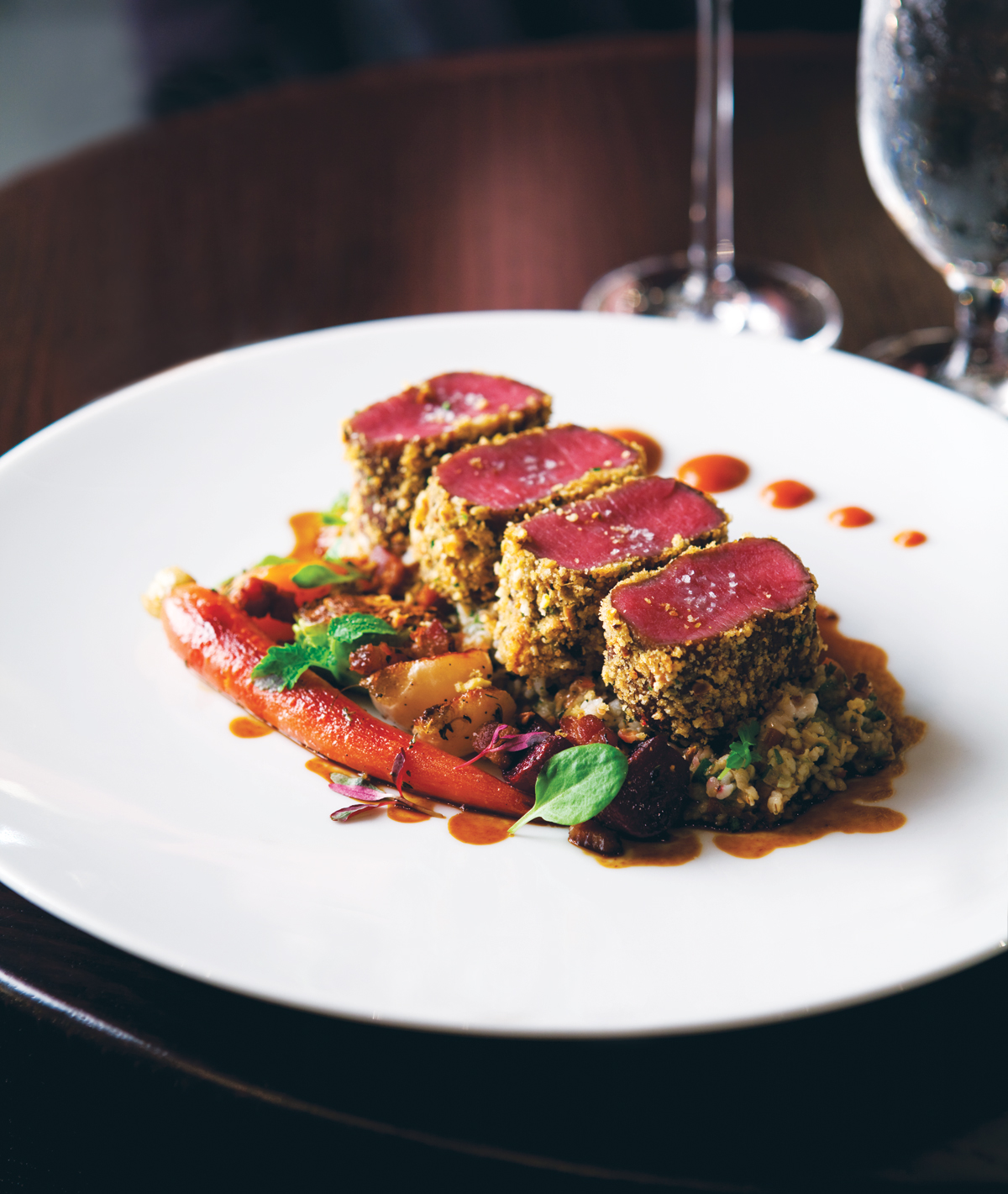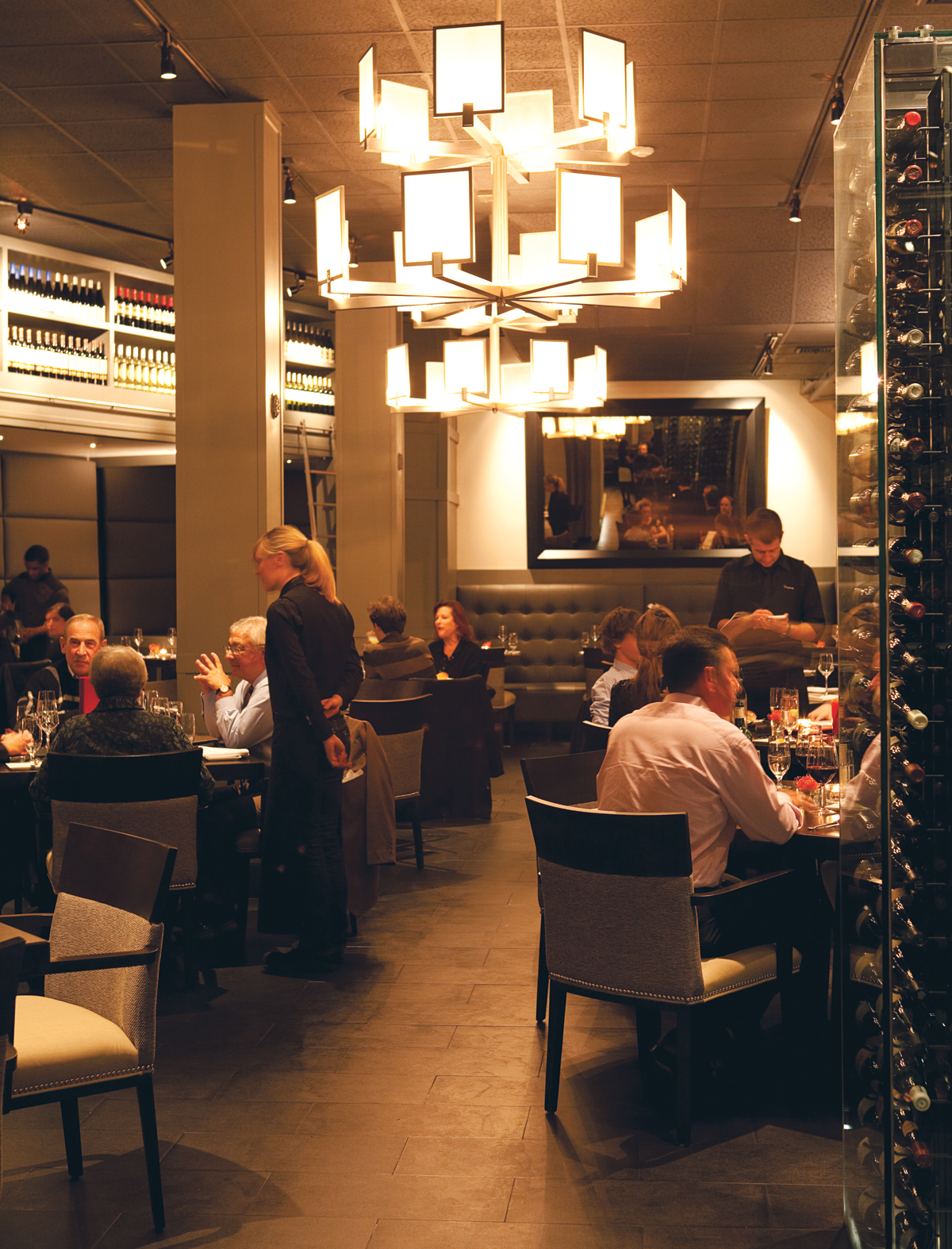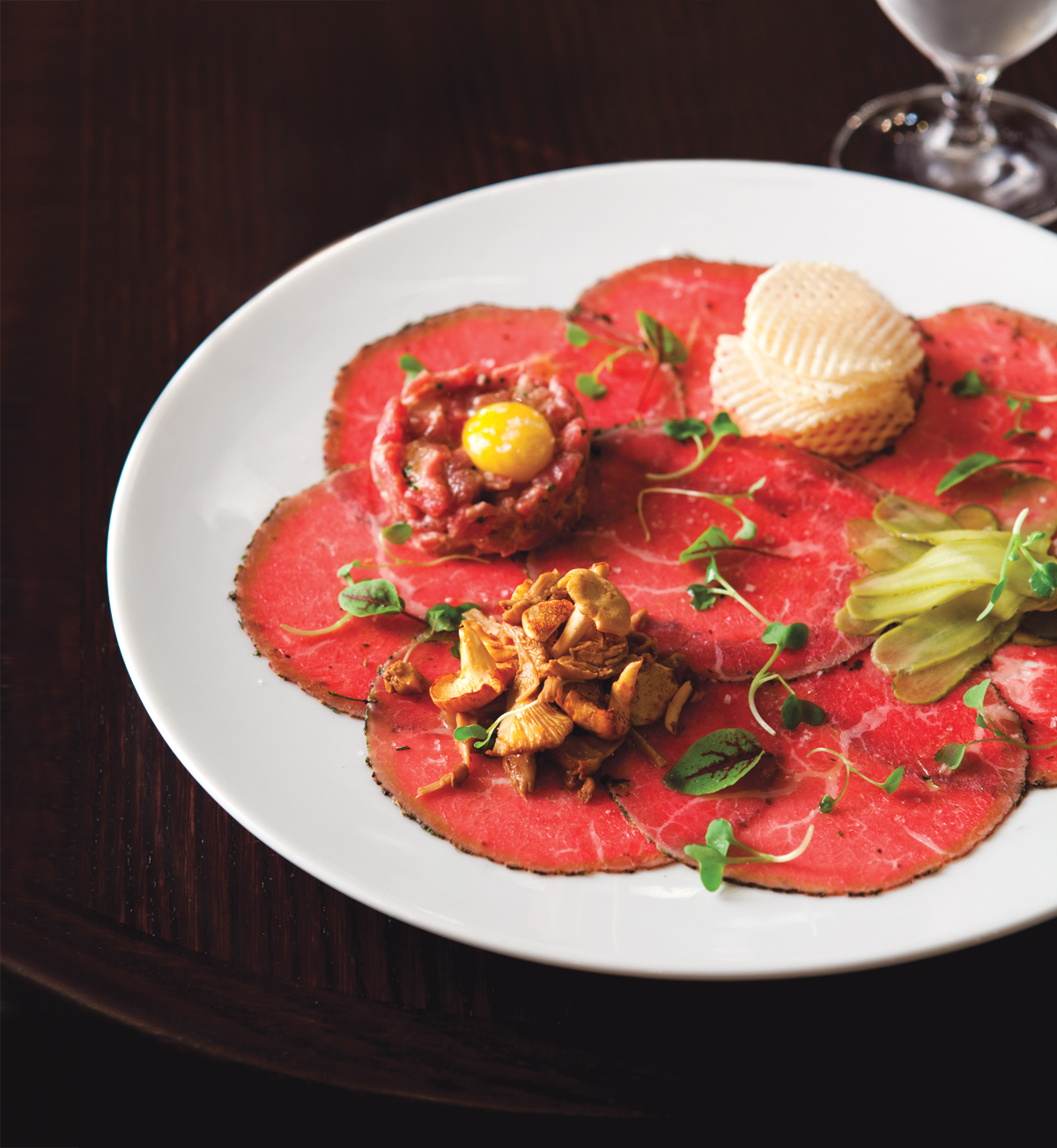Restaurant Review: Deuxave
With lofty ambitions and kitchen talent to spare, a Back Bay newcomer aims high—but doesn’t always hit the mark.

Nine-hour French onion soup with Comte cheese and beef-bone-marrow crouton, $10 / Photograph by Keller + Keller
After three dinners at Deuxave and a long conversation with the very American chef, Christopher Coombs, I still don’t have a clue what the name means. You’d think it was French for Second Avenue, even though that would be Deuxième. Certainly the voice on the answering machine, like the menu, is French-accented. The garbled message sounds like it’s saying “Gérard.” The chef and most of the staff pronounce the restaurant’s name more like “doo-wah.”
I’m not simply picking on people for their inadequate French diction; the name is more or less impossible to pronounce, anyway. But all this perplexity hints at the confusion over just what Deuxave is aiming to be: French, for sure, and high-toned. Coombs is also the chef behind Dorchester’s Dbar, and he and co-owner Brian Piccini have made it one of the go-to places in that neighborhood (where admittedly the competition isn’t steep). But as friendly and accessible as Dbar is, Coombs said in an interview, it wasn’t giving him the artistic scope he was after.
And that, I think, is most of the problem. Deuxave’s menu is fancy, with over-burdened dishes that can be as tiring to hear about as they are to eat and comprehend; there’s at least one flavor too many in almost every dish.
Coombs does have real technique, as he’s too eager to show, and he’s particularly good with meat. And I’m ready to see the restaurant’s grand space on Commonwealth Avenue, across the way from Clio, succeed after several food halls and dining concepts (most recently a too-big outpost of Panificio, the Beacon Hill sandwich standby) have failed there.
But that will take some real overhauling. Coombs needs to simplify his menu and highlight the deep flavor that his technique brings to the best dishes. Like the nine-hour French onion soup ($10) — a dish I didn’t know I missed so much till I had his. It’s served in a small version of the white ceramic bowls you might recall from your first trip to France. The beef-broth base tastes like beef, not like some generic stock; the onions have been carefully caramelized but not burned, which takes constant watching and a ridiculous amount of patience. The crouton on top sports lots of real Comte, my favorite French cheese, though there’s actually so much that it’s dull and soft. To add crunch, Coombs puts a sliver of toasted baguette on the side, slathered in beef marrow. Even with the plasticized cheese, this is an appetizer you wish came in a bigger portion… except for all the salt.
In fact, along with the general fussiness of the menu, salt is a big problem at Deuxave. There’s too much of it everywhere, and it makes enjoying a meal there a real challenge. A so-called “crispy” duck confit appetizer ($14), flabby and soft one night despite its name, was way oversalted, as was the heirloom-cranberry coulis underneath. On another visit, the duck skin was wonderfully crisp, the meat as melting and full of flavor as you could wish, but salt still overwhelmed the coulis. Oversalted lentils under a somewhat chewy entrée of duck breast ($28) made them a no-go part of the dish. Luckily, there was plenty else going on, such as the foie-gras-stuffed prunes soaked in port, and nice, plump, fresh turnips that were sautéed just right.
But back to the salt. An entrée of scallops with rosti (crisp grated potatoes) and a harshly herbal “leek and parsley fondue” — a variation on salsa verde — was mostly inedible because so much on the plate was so salty ($28). And when I say “so much on the plate,” I’m not kidding: try dill cream, roasted-tomato confit, gingered cumin-carrot emulsion (in a silly foam), and lemon-vodka syrup, not to mention thin shavings of fresh black truffles, which, of course, didn’t stand a chance. All you tasted was the salt and the seemingly raw leek in that green sauce. Extraneous elements and inconsistency marred other dishes, including overcooked halibut served with undercooked succotash and a head-scratching sunchoke purée and pomegranate reduction ($27).
But then it happens: A bite of something outstanding will bring Coombs’s vision back into focus. Or one component will be so succulent that nothing else matters. That was the case with the two standout entrées, beef and lamb. Meat is what Coombs does well, and it was the star of every dinner, even in a relatively plain appetizer of beef tartare and Wagyu carpaccio with homemade potato gaufrettes ($14).
The best meat — the best dish, really — is New York strip steak, pan-roasted and basted with butter, accompanied by whole glazed carrots from Long Island’s Satur Farms, wild mushrooms, and an expert bordelaise sauce. The steak medallions are placed over a soubise, again showing Coombs’s way with carefully caramelized onions. It was sumptuous — the meat was tender and buttery but packed with flavor, attributes often at direct odds in beef — and well worth the $39.
Moroccan-spiced lamb saddle ($29) hardly tasted of the spices, and also had way too many components. (I won’t bother to list them.) But it also had a lovely and not-muttony taste, and the pistachio–bread crumb crust lent it a nice crunch. Veal and beef gave richness to tagliatelle “Bolognaise” ($21), though the homemade egg noodles were almost as wide-cut as pappardelle. The preparation is French, anyway, with the noodles coated — or rather, congealed — in rendered foie gras fat and an inexplicable slab of buffalo-milk mozzarella melted over the top.
Pastry chef Olivier Maillard’s desserts follow overcomplicated suit, with a pointlessly, if prettily, deconstructed tiramisu ($13). There’s good Marsala-mascarpone cream in its thin-walled chocolate pipes, and wedges of espresso dacquoise that stand up on the plate, creating what looks like a Rube Goldberg confection. It’d be better, maybe, just to serve the usual glop that tiramisu is. But again, certain elements come into sharp focus, and you think, How come everything isn’t like this? With desserts, that’s a trio of high-quality homemade ice creams — including an interesting, tamarindlike tonka bean ($9) — and a coconut crème brûlée ($10) with orange sorbet. The brûlée is creamy and flanlike but not too sweet, and with only the faintest reminder of coconut.
This is showy, eager-to-please food. Deuxave’s service is eager, too, and though one night was full of crossed wires and delays, things eventually calmed down and it ended up being a really enjoyable evening (even if the food was the least memorable part). For now, take pleasure in the lovely setting and the warm service if you’re having, say, wine and onion soup and steak. To order more (and with more confidence), you’ll just have to wait for that overhaul.
Deuxave, 371 Commonwealth Ave., Boston, 617-517-5915, deuxave.com.

Moroccan-spiced lamb saddle with Persian-style tabbouleh and minted-cucumber raita, $29 / Photo by Keller + Keller

Cool neutrals and gleaming racks of wine give Deuxave’s dining room a refined ambiance. / Photo by Keller + Keller

Duet of beef tartare and Wagyu carpaccio with chanterelles and potato gaufrettes, $14 / Photo by Keller + Keller


